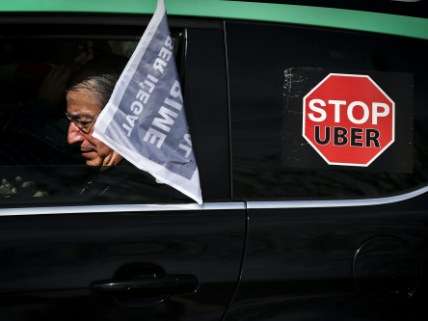Uber's Efforts to Bypass Nanny Regulators Lead to Federal Criminal Investigation
Secret tool allowed drivers to detect and avoid stings.

When The New York Times revealed in March that Uber had a secret tool that helped its drivers bypass municipal government nannies attempting to shut them down, I openly cheered the company on.
But now, Reuters notes, the Department of Justice is investigating Uber to determine whether this tool, called "Greyball," broke the law somehow. Reuters is short on details, unfortunately, as the investigation is in its early stages and the reporting is reliant on unnamed sources.
Greyball is a secret software tool within Uber's app that allowed the company to essentially create a ghost or faked version of its ride-hailing service. If there was a user of the app that the company didn't want to serve but they also didn't want the user to know, it could simulate fake cars and information. The user would request a ride that would never actually arrive, and he or she wouldn't know what was happening.
The utility of such a tool should be obvious to anybody who has been following Uber's conflicts with entrenched taxi interests. In some countries Uber drivers face actual violence from those who do not want to give up their cartelized government-protected domination of on-call transportation. Furthermore, ride-sharing services, just like taxi drivers, have to deal with dangerous people and frauds. If they know a particular person has threatened or harmed their drivers in the past, they have a good reason to quietly want to deny this person access.
But local government officials playing their role in protecting their taxi industry buddies also presented a threat and a challenge. In communities that blocked ride-sharing services (or declined to grant them official permission, to be a little more accurate), drivers risked getting fined and their cars impounded in stings from regulators. So the Greyball tool allowed Uber drivers to avoid these stings and avoid being punished or financially harmed in cities like Portland, Oregon, where regulators were actively trying to keep them from operating.
After the Times exposed Greyball, Uber has ordered that it not be used for the purpose of evading regulators. Now Uber has received a subpoena from grand jury in Northern California seeking information about Greyball and how it works.
Reuters notes that the revelation of the existence of Greyball "triggered a barrage of negative publicity" for Uber. Well, that's certainly not how it played out among those who see the reality of municipal regulation as a tool that protects select entrenched interests against competition.
The reality is that the negative publicity came primarily from those who are already outraged about Uber and the existence of Uber and the threat that ride-sharing presents both to entrenched commercial cartels and also top-down regulatory economic controls that originate from city leaders. From hotels to taxi companies, cities and companies have operated hand-in-hand in working out ways for both to maximize revenue at consumers' expense. The regulatory and taxation system guarantees a flow of money to the city. The system also serves as a massive barrier to entry for new businesses who can't afford to compete. And the consumer ends up paying more, while low-income citizens have fewer opportunities to make money.
Did you hear the recent story that Uber was tracking people's iPhones even when they deleted their app and was threatened by Apple over it? Those basics were factually accurate, but the reality was much more complicated and less sinister: They were trying to prevent fraud from people using stolen phones and credit card numbers. Read more about what actually happened here.


Show Comments (6)